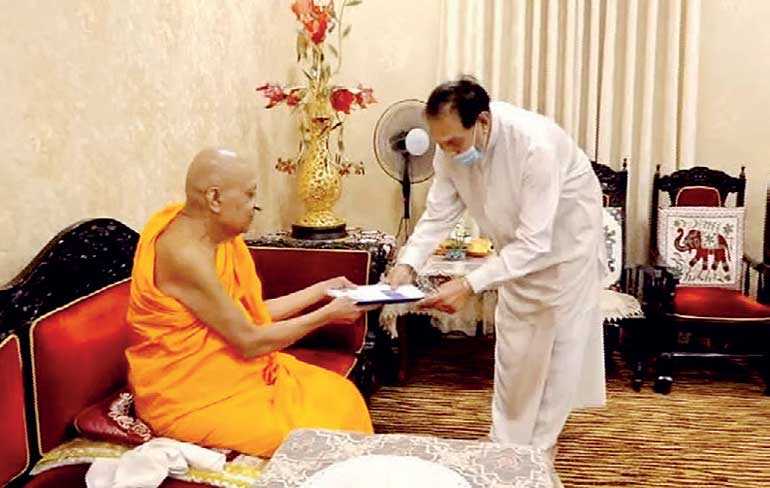Wednesday Feb 18, 2026
Wednesday Feb 18, 2026
Tuesday, 6 October 2020 01:23 - - {{hitsCtrl.values.hits}}

The Mahanayaka Theros of the main Buddhist chapters of Sri Lanka said they are vigilant of the different opinions expressed by the different segments of society, and as such intend to make broader discussions and consultations with the prelates of the other chapters too on the proposed 20th Amendment to the constitution.
They expressed these views when the Chairman of the National Movement for Social Justice (NMSJ) Deshabandu Karu Jayasuriya, paid a courtesy visit to the Chief prelates of the Asigiriya, Malwatta and other key chapters.
During the visits, the former speaker held discussions with the Mahanayaka of the Malwatta Chapter Venerable Thibbatuwawe Sri Siddhartha Sumangala Thero, Mahanayaka of the Asgiriya Chapter Venerable Warakagoda Sri Gnanarathana Thero, Mahanayaka of the Sri Ramanya Chapter Venerable Napane Sri Pemasiri Thero, Mahanayaka of the Sri Kalyani Sangha Sabhawa Iththepane Dhammalankara Thero, Venerable Elle Gunawasnsha Thero and other chief priests, on the proposed 20th Amendment and the impending challenges.
During the discussions, the delegation of the NMSJ emphasised the danger if the proposed 20th Amendment is implemented without any further consultation and rectification of some of the critical aspects that challenge the democracy, accountability and sovereignty of the country. Further, the group presented a report titled, “Vision for a Democratic Nation: Challenges set by the 20 Amendment,” compiled in consultation with key academia, professionals, and civil society, which was led by the NMSJ.
The National Movement for Social Justice firmly believes in a new constitution that sets forth democratic values, highest accountability and law and order, that suits a modern nation, and one that protects the rights of all citizens, and reiterates the need for a broader national consultation in this process, engaging varying stakeholders including national leaders, administrators, policy makers, religious leaders, politicians, women, youth, irrespective of religion, ethnicity and race.
The delegation consisted of Former Speaker Karu Jayasuriya, Professor Rohan Samarajiva, Sunil Jayasekara, Palitha Lihiniya Kumara and Harendra Dissanayaka.